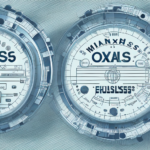Comparing PEC Scales and Ohaus D51XW: Which Industrial Scale is Right for You?
Choosing the right scale for your business is crucial for ensuring accuracy, efficiency, and compliance with industry standards. With a plethora of options available, distinguishing between the best choices can be challenging. Two prominent contenders in the market are PEC Scales and the Ohaus D51XW. This comprehensive comparison delves into their features, performance, and suitability to help you make an informed decision.
Overview of PEC Scales and Ohaus D51XW
PEC Scales have established themselves as trusted brands in the industrial weighing sector for over 25 years. Renowned for their reliability and durability, PEC Scales cater to diverse applications across food processing, pharmaceuticals, and manufacturing industries. In contrast, the Ohaus D51XW series is celebrated for its precision and accuracy, making it a staple in commercial and industrial environments, including shipping, receiving, and quality control.
Both PEC Scales and Ohaus D51XW offer a versatile range of scales with various capacities and advanced features such as checkweighing, counting, and percentage weighing. This versatility ensures that businesses can find a scale tailored to their specific needs, enhancing operational efficiency and accuracy.
History and Evolution
PEC Scales began its journey in 1996, focusing on innovative weighing solutions for the UK industrial sector. Over the years, they have expanded globally, serving industries like agriculture, mining, and more. Their commitment to research and development has led to the creation of advanced weighing technologies that meet the dynamic needs of their customers.
Ohaus, with a rich history dating back to 1907, started with the production of analytical balances. The brand has evolved significantly, now offering a comprehensive range of professional-grade scales known for their precision and durability. The Ohaus D51XW is a testament to their legacy, designed to withstand harsh industrial environments while providing accurate measurements.
Key Features Comparison
PEC Scales
- Durable construction using high-quality materials
- IP67 rating for dust and water resistance
- User-friendly tactile and responsive controls
- Clear LED display for enhanced readability
- High accuracy and precision for reliable measurements
Ohaus D51XW
- Multiple capacities and platform sizes to accommodate various needs
- High accuracy with up to 10,000 divisions for precise measurements
- Bright LCD display for easy reading in different lighting conditions
- Programmable auto-off function to conserve energy
- GLP/GMP printouts for comprehensive data tracking and traceability
Both scales offer connectivity options such as USB and Ethernet ports, facilitating seamless data transfer and integration with other systems. Additionally, user-friendly software allows for customization of settings and execution of specialized functions like counting and percentage weighing.
Precision and Accuracy
Precision and accuracy are critical in selecting the appropriate scale. While both PEC Scales and Ohaus D51XW offer high precision, the Ohaus D51XW surpasses PEC with its resolution capability of up to 10,000 divisions compared to PEC’s 3,000 divisions. This higher resolution ensures more detailed measurements, which is essential for applications requiring fine precision.
In terms of capacity, PEC Scales handle up to 5,000g, making them suitable for medium-scale operations. Conversely, Ohaus D51XW scales can manage up to 20,000g, catering to larger and heavier items, thereby offering greater versatility for diverse industrial applications.
Durability and Reliability
Durability is a key consideration for industrial scales. PEC Scales feature a rugged design with high-quality materials, ensuring longevity even in harsh environments. Their construction minimizes wear and tear, making them reliable for continuous use.
Ohaus D51XW scales are constructed with stainless steel and robust components, providing exceptional durability and resistance to industrial wear. Their reliable build ensures consistent performance, reducing the need for frequent repairs and maintenance.
Ease of Use
User-friendliness significantly impacts the efficiency of scale operations. PEC Scales are equipped with tactile controls and a clear LED display, making them easy to operate even in low-light conditions. Their intuitive design reduces the learning curve, allowing for quick adoption by staff.
Ohaus D51XW scales offer an intuitive interface and a bright LCD display, enhancing ease of use for both new and experienced users. Features like the dynamic weighing mode and parts counting mode simplify complex weighing tasks, boosting productivity and accuracy.
Maintenance and Calibration
Regular maintenance and calibration are essential for maintaining accuracy. PEC Scales include an internal calibration system and allow for external calibration using standard weights, ensuring ongoing precision. Their design facilitates easy maintenance, minimizing downtime.
Ohaus D51XW scales feature an automatic calibration mode that maintains accuracy without constant manual intervention. The programmable auto-off function not only conserves energy but also reduces the frequency of maintenance, offering cost-effective reliability.
Pricing and Value
Price is a significant factor for businesses when selecting a scale. Generally, PEC Scales are more affordable, providing essential weighing capabilities at a lower cost. This makes them an excellent choice for businesses seeking value without extensive features.
Ohaus D51XW scales are priced higher but justify the cost with advanced features such as programmable auto-off functions and GLP/GMP printouts. These additional functionalities offer enhanced data management and operational efficiency, making them a worthy investment for businesses requiring comprehensive weighing solutions.
User Reviews: Pros and Cons
Feedback from users provides valuable insights into the performance of both scales. PEC Scales are praised for their rugged design, high accuracy, and excellent value for money. However, some users note the absence of advanced features like GLP/GMP printouts and auto-off functions as a drawback.
On the other hand, Ohaus D51XW users commend the scale's superior accuracy, ease of use, and advanced features, which enhance data tracking and operational efficiency. The higher price point and occasional calibration challenges are often cited as cons by users.
Factors to Consider Before Purchasing
Before making a purchase, businesses should evaluate several factors to ensure the scale meets their specific needs:
- Accuracy and Precision: Ensure the scale provides the required level of detail for your applications.
- Durability: Consider the build quality and suitability for your working environment.
- Ease of Use: A user-friendly interface can enhance productivity and reduce training time.
- Maintenance and Calibration: Assess the ease of maintaining and calibrating the scale to ensure long-term accuracy.
- Additional Features: Determine if advanced functionalities like data tracking, connectivity options, and specific weighing modes are necessary.
- Cost and Budget: Align your choice with your budget while considering the value and features offered.
Conclusion: Choosing the Best Scale for Your Business
Both PEC Scales and Ohaus D51XW offer reliable and efficient weighing solutions tailored to different industrial and commercial needs. PEC Scales provide excellent value with their durability and accuracy, making them ideal for businesses seeking cost-effective solutions. Conversely, the Ohaus D51XW series excels with its high precision, advanced features, and superior durability, suitable for businesses that require comprehensive and reliable weighing capabilities.
Ultimately, the best scale for your business will depend on your specific requirements, budget, and the importance you place on features such as precision, durability, and advanced functionalities. By carefully evaluating the factors discussed, you can select a scale that enhances your operations and contributes to your business's success.






















